END of NIZAMI
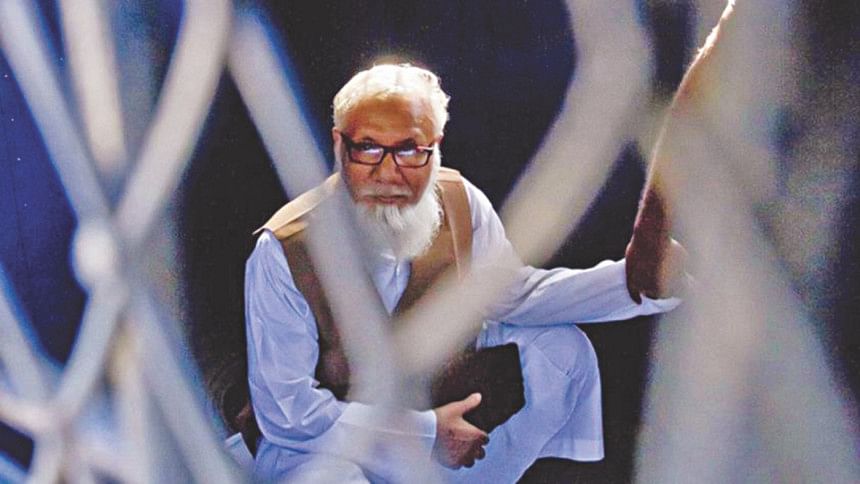
He had opposed the very notion of Bangladesh.
From writing anti-liberation pieces in newspapers to instigating his fearsome gang called Al-Badr Bahini to kill unarmed civilians to directly participating in massacre, Motiur Rahman Nizami made every possible effort during the 1971 Liberation War to make sure Bangladesh never comes into being.
As these acts of cold-blooded cruelty were proving inadequate to resist the birth of the nation, the man, aided by the Pakistan army, unleashed his ruthless force to wipe out the brightest minds of the soil to rob the newborn nation of its brain and thwart its progress on the eve of Bangalees' final victory.
Forty-five years after his crimes against humanity, justice finally caught up with him with his hanging early hours today.
"The execution of Nizami was carried out at 12:10am," Jahangir Kabir, senior jail superintendent of Dhaka Central Jail, told reporters at the jail gate.
Guarded by law enforcers, an ambulance carrying his body came out of the prison around 1:30am and headed for his village home at Santhia upazila in Pabna.
He will be buried at his village graveyard in Monmothpur, said Nasir Uddin, officer-in-charge of Santhia Police Station.
Jamaat condemned the hanging and called a countrywide 24-hour hartal for tomorrow for what it called protesting the “state-sponsored killing” of its leader.

Various pro-liberation forces, including Gonojagoron Mancha which champions the demand for capital punishment for war criminals, hailed his hanging.
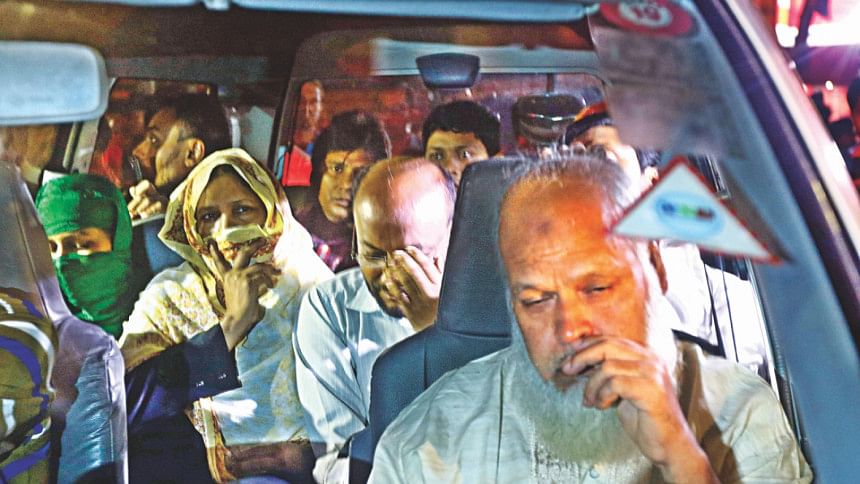
"It was as if a heavy stone was sitting on our chests. It's gone now. We feel very relieved," Shyamoli Nasrin Choudhury, wife of martyred intellectual Dr Alim Chaudhury, told this newspaper.
Nizami is the fifth war criminal and fourth Jamaat leader to have been hanged for war atrocities. He committed crimes, including killing of intellectuals and mass murders in his hometown Pabna during the war.
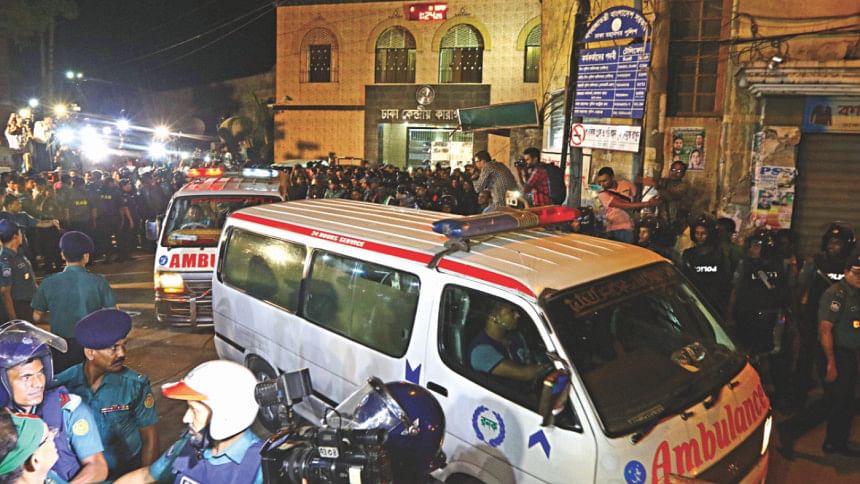
He was given death penalty on three charges -- killing of intellectuals; killing of 450 people in three Pabna villages (Bausgari, Ruposhi and Demra) and rape of 30 to 40 women there; and killing of 52 people in Dhulaura village, also in Pabna.
The court also sentenced him to life imprisonment on two other charges -- killing of Sohrab Ali Brishalikha village in Pabna and killing of freedom fighters Rumi, Bodi, Jewel and Azad in Dhaka's MP hostel.
The execution process began after he declined to seek presidential mercy, the last option to avoid the gallows.
"Nizami did not seek presidential clemency. The order to execute the death sentence has been sent to the prison authorities," Home Minister Asaduzzaman Khan Kamal told The Daily Star around 9:00pm yesterday.
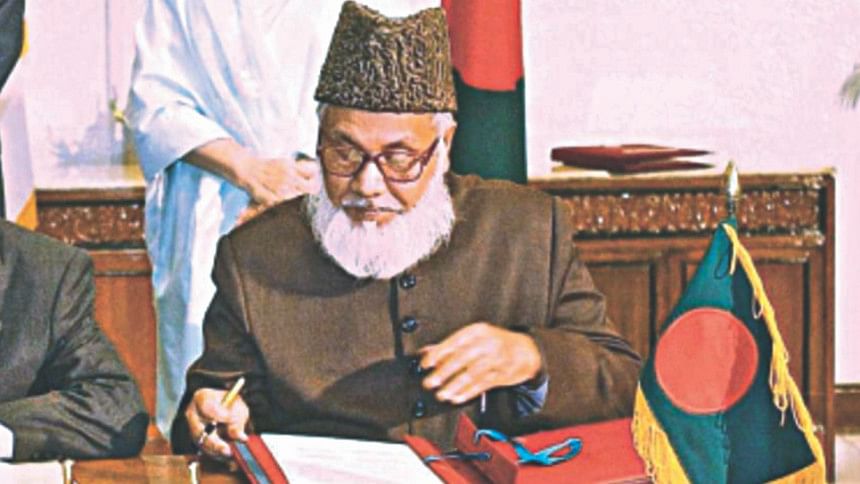
The countdown to the Jamaat chief execution began after the Supreme Court dismissed his review petition on Thursday. The process of execution gained pace after the apex court on Monday released the full text of its verdict, and sent it to the international crimes tribunal that originally tried and convicted him.
The tribunal on Monday sent the copy of the verdict to the Dhaka Central Jail, and the jail authorities read out the verdict to Nizami.
Yesterday, as the jail authorities asked him whether he would seek mercy, he replied in the negative, said jail sources.
As the day rolled on, swarms of journalists and onlookers gathered near Dhaka Central Jail. Security measures around the jail were beefed up and the roads leading to the jail were blocked with barricades.
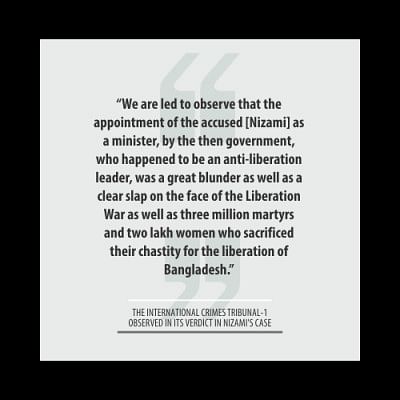
Around 6:00pm, the prison authorities asked Nizami's family to meet the death-row convict at the jail. Around 8:00pm, three cars carrying 24 family members arrived at the jail gate. Nizami's wife, two sons and a grandchild were among them. They went in straightaway and came out at 9:30pm.
Born on March 31, 1943, in Monmothpur village in Santhia of Pabna, Nizami was the president of Jamaat's student wing Islami Chhatra Sangha (ICS) from 1966 to September 1971 and ex-officio chief of Al-Badr.
A cursory glance at the records of his activities during the nine-month war brings out his active collaboration with Pakistani occupation forces. At times he was seen in rallies and meetings with the then Jamaat Chief Ghulam Azam while at other times he was seen visiting the Mohammadpur Physical Training Institute where Jamaat and its auxiliary forces tortured intellectuals and freedom fighters. He was seen anti-liberation rallies in Pabna, Chittagong and Jessore.
He used to write articles in Dainik Sangram, the mouthpiece of Jamaat, the party that took stance against the war.
As a top leader of the ICS, he masterminded the formation of the militia that killed unarmed civilians, raped women and destroyed properties during the nine-month bloody war that saw some 30 lakh people killed and about 2.5 lakh women raped.

Towards the end of the war, the Al-Badr Bahini committed “crimes of serious gravity intending to demean the human civilisation,” said the ICT-1 in its 2014 verdict.
After the war, Nizami went into hiding. He, like many other anti-liberation people, was rehabilitated after the assassination of Bangabandhu Sheikh Mujibur Rahman and most of his family members in 1975. He became a minister during the BNP-led government's tenure between 2001 and 2006.
He was arrested in August 2010, five months after the war crimes tribunal was formed on March 26 the same year.
His trial took four years to complete and faced many challenges.
Finally in October 2014, the International Crimes Tribunal-1 sentenced him to death for war crimes, and the Supreme Court on January 6 this year upheld the death penalty.
Nizami filed a petition with the SC, seeking review of his conviction and sentences against him, but that was dismissed.
Before him, Jamaat leaders Abdul Quader Mollah, Muhammad Kamaruzzaman and Ali Ahsan Mohammad Mojaheed, and BNP leader Salauddin Quader Chowdhury were executed for war crimes.
(Rashidul Hasan, Shaheen Mollah and Rafiul Islam also contributed to this report.)

 For all latest news, follow The Daily Star's Google News channel.
For all latest news, follow The Daily Star's Google News channel. 


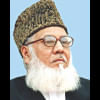
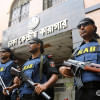




Comments